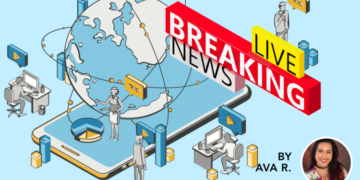In recent years, there has been an emergence of new ways to invest, with free apps such as Robinhood entering the field against established online firms such as Fidelity. When I first began my journey into the market, this was my biggest question- do I use a new upstart or an established online broker? I knew more people my age using Robinhood- it was free, easy to learn, and had many successful users. Very few people I knew used Fidelity, and due to that, I decided to begin with Robinhood. However, after a few months, I decided to investigate established brokers and see what they had to offer- and to see if it would be better for me to use.
Each broker has major differences when looking at Robinhood and Fidelity, one is an established discount online broker, while one is a new upstart. Fidelity is constantly evolving to fit its users and has become a major player regarding online brokerages, and recently took a top spot overall in the 2019 and 2020 Best Online Brokers Awards, a system conducted by Investopedia. As the firm continues to enhance its platform, it still manages to keep costs low. In comparison, Robinhood is still in the early stages of development, and still has opportunities to implement new apps and strategies for its users. Currently, it does not charge commission fees, and has options and cryptocurrency trading- all of this is advertised and is what drew me to Robinhood.
A key thing to worry about when investing is security, and each of these brokers has it up to standards. Fidelity offers face and fingerprint options on their mobile app, and if a user were to log in from an unknown browser, security questions are asked. Any high-risk transaction, such as a wire transfer, require two-factor authentication. On top of this, Fidelity carries excess Securities Investor Protection Corporation (SIPC) Insurance, which includes a $1.9 million limit on uninvested cash. In comparison, Robinhood has high technical security, with its mobile app requiring a face, fingerprint, or custom pin recognition and encourages its users to enable two-factor authentication. If a user were to log in from an unrecognized device, a verification code is sent to a phone number or email. However, Robinhood does not carry any SIPC insurance.
On top of this, back in 2019, Robinhood’s security was breached, with user passwords no longer encrypted and openly available. The company took full responsibility for the breach, and luckily no information was taken, however, it raises some concerns. Once an account is broken into, all user information, as well as bank information, is available. On the other hand, Robinhood is still a startup trying to work out all the bugs and appeal to its users and has done well with its security.
Robinhood appeals to the “now” generation, as it is very user friendly. The website and app are laid out in the same fashion, making it easy to retrieve information and trade on either platform. There is little customization for a personal experience, but that is not necessarily important to users. Prices update while the app or website is being used, but at times may lag as compared to real-time data provides. Robinhood can be described as “too-simple”, however, its simplicity draws many in, as other brokers such as Fidelity can become overwhelming for newer investors with the amount of information and options available. Fidelity is user friendly. The firm tends to attract more experienced traders, but it does address challenges faced by beginner traders. There are more education and information readily available to new users and is appealing to less active investors-those wishing to buy and hold.
Overall, those who are brand new to investing and have a relatively small balance to start with would benefit from Robinhood. Both the website and the app are not overwhelming and they are easy to use. But they could offer more information about the market, and trading for the benefit of users. As an investor becomes more experienced, Fidelity would be the way to go. It offers all experience levels and has more options to work with as well as more education and research, which helps when making educated decisions about trading.










































